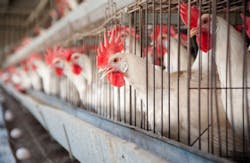FSA: Two in three chickens in Wales infected with Campylobacter
Welsh authorities have been trying hard to clamp down on the most frequent cause of food poisoning in the UK — Campylobacter bacteria — but so far they have seen little success.
Despite all the funding that the UK Food Standards Agency (FSA) has already invested in programs to eliminate the bacteria, approximately two in three chickens on the market are infected with Campylobacter, the agency's food safety director Steve Wearne admitted.
Poultry is the most common source of the bacteria, accounting for between 50% and 80% of all cases, with the majority of these linked to chicken. The bacteria can be picked up by consumers who either undercook the meat or handle the raw poultry improperly.
An average of 100 Britons die of campylobacteriosis every year, but rates vary, Wearne said. In Wales alone, more than 4,000 people were diagnosed with campylobacteriosis in 2012, while so far this year figures have reached 2,466. Since 2005 the rates of the disease have been going up, even though the rate of growth has slowed down since 2010, Wales Online noted.
RELATED: Antibiotics in chicken kill 280 Brits every year
Tackling with Campylobacter is top priority for the FSA but unlike Salmonella, which was put under control years ago thanks to a vaccine, Campylobacter cannot be eliminated with a one-size-fits-all approach, poultry industry experts say.
The industry thinks that its best hope of tackling the bacteria lies in increasing bio-security and ensuring that basic safety precautions are followed, such as washing hands frequently and changing clothes and shoes.
